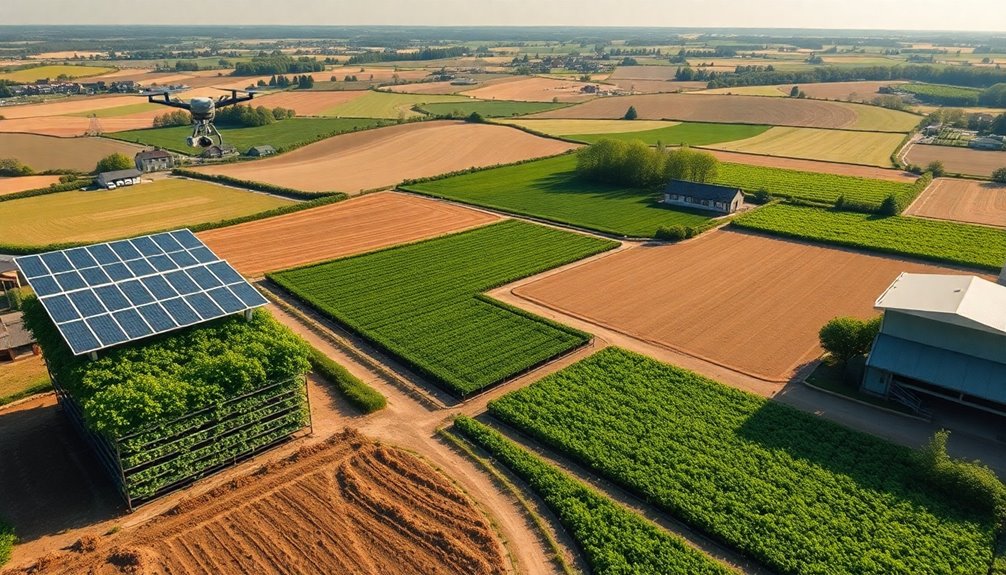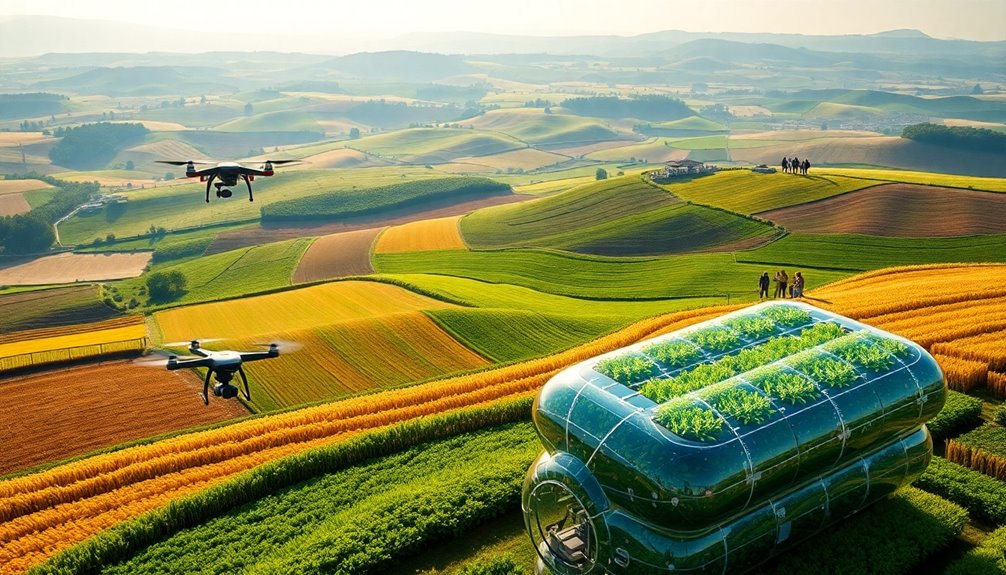Pioneering approaches like precision farming and climate-smart agriculture are set to redefine agriculture across Europe. By using satellite technology and IoT, you can monitor crops in real-time and optimize efficiency. Innovative practices such as vertical farming and water management improve sustainability and resilience. These methods not only reduce costs but also minimize environmental impact. To understand how these exciting developments can benefit you, explore more about the advancements shaping the future of farming.
Key Takeaways
- Innovative farming techniques like vermicomposting and agroforestry enhance soil health and sustainability across European farms.
- Precision farming employs satellite technology and IoT sensors, improving crop management and aligning with EU sustainability goals.
- Climate-smart agriculture practices, including conservation tillage and crop diversification, boost resilience against climate change impacts.
- Innovative crop management methods, such as vertical farming and hydroponics, facilitate year-round production in urban settings.
- Integrating renewable energy, like solar and wind, enhances farm efficiency while promoting regenerative agriculture practices.

Agriculture is evolving faster than ever, driven by innovative techniques that prioritize sustainability and efficiency. You might be intrigued by the pioneering farms across Europe, like Grand Farm in Austria and ERF in the Netherlands. These farms aren't just about producing food; they focus on soil health through practices like vermicomposting and agroforestry. The largest organic farm in the Netherlands is also implementing strip cropping systems to enhance biodiversity and improve soil structure.
They're also integrating with research institutions to enhance biodiversity and soil resilience. By adopting these methods, you can contribute to a more sustainable food system.
Precision farming is another groundbreaking approach that's gaining traction. With satellite technology and IoT sensors, you can monitor your crops and soil conditions in real-time. Imagine using AI and machine learning to analyze data that optimizes your farm management decisions.
Precision farming harnesses satellite tech and IoT sensors for real-time monitoring, optimizing farm management with AI and machine learning.
Though only about 25% of European farms are currently using precision farming, the efficiency improvements are significant, reducing input costs and minimizing environmental impact.
In line with the EU Green Deal goals, climate-smart agriculture is becoming essential. You could adopt conservation tillage to improve soil health, or diversify your crops for enhanced resilience.
Water management practices, such as drip irrigation, can make a noticeable difference in resource efficiency. Approximately 30% of European farms are utilizing these practices, showcasing a commitment to sustainability.
Innovative crop management techniques, like vertical farming and hydroponics, are also on the rise. These methods allow for year-round production in controlled environments, perfect for urban settings.
By utilizing biological pest control, you can significantly reduce chemical usage while maintaining high productivity.
Renewable energy integration is another key aspect of modern agriculture. By adopting solar-powered irrigation or wind energy, you not only cut down on non-renewable energy reliance but can also generate additional income.
With sustainable fertilizers and regenerative agriculture practices on the horizon, you're in a unique position to redefine agriculture and contribute to a resilient future. Embrace these pioneering approaches, and you'll be part of the agricultural revolution.
Frequently Asked Questions
What Are the Environmental Impacts of These Pioneering Approaches?
These pioneering approaches significantly reduce environmental impacts.
By utilizing bio-based innovations, you lower greenhouse gas emissions and enhance soil health. Sustainable agricultural practices cut chemical use and promote biodiversity, while precision farming optimizes resources, reducing waste.
Technological advancements like AI and renewable energy integration further minimize environmental footprints.
How Do These Methods Affect Food Pricing for Consumers?
When it comes to food pricing, you've got to consider the bigger picture.
Innovative agricultural methods can stabilize supply chains and reduce volatility, keeping prices in check. By embracing precision farming and regenerative practices, you're not just improving yields; you're also lowering costs.
As consumer demand for sustainable products rises, you might find that while some prices go up, many remain stable or even drop due to increased efficiency and competition.
Are There Government Incentives for Adopting These Agricultural Practices?
Yes, there are several government incentives for adopting sustainable agricultural practices.
You can access funding through the European Union's Common Agricultural Policy, which allocates significant resources to support organic farming and climate action.
Additionally, initiatives like the European Agricultural Fund for Rural Development offer financial assistance for rural development projects.
With tailored loans and risk-sharing mechanisms, you'll find opportunities to enhance your farming practices while contributing to environmental sustainability.
What Role Do Consumers Play in Supporting These New Approaches?
Imagine walking through a vibrant farmers' market, where fresh, sustainable produce catches your eye.
You play a crucial role in this scene, driving demand for eco-friendly products and supporting local food systems. Your choices influence farmers to adopt sustainable practices and embrace new technologies.
How Can Small-Scale Farmers Implement These Pioneering Techniques Effectively?
To implement these pioneering techniques effectively, you should start by exploring digital solutions tailored for your farm's needs.
Join cooperatives to share knowledge and resources, and consider diversifying into organic or niche markets.
Embrace sustainable practices like precision irrigation and carbon sequestration for long-term benefits.
Don't forget to access funding through programs like CAP or Horizon Europe, which can provide essential financial support for innovation and infrastructure improvements.
Conclusion
As you explore these pioneering approaches, you'll see how they can reshape agriculture across Europe like a fresh breeze sweeping through a stagnant field. Embracing innovation not only boosts productivity but also fosters sustainability, ensuring a healthier planet for future generations. By adopting these transformative methods, you're not just planting seeds in the ground—you're sowing the future of farming. Together, we can cultivate a brighter agricultural landscape that thrives on creativity and responsibility.








